 Petzlover
Petzlover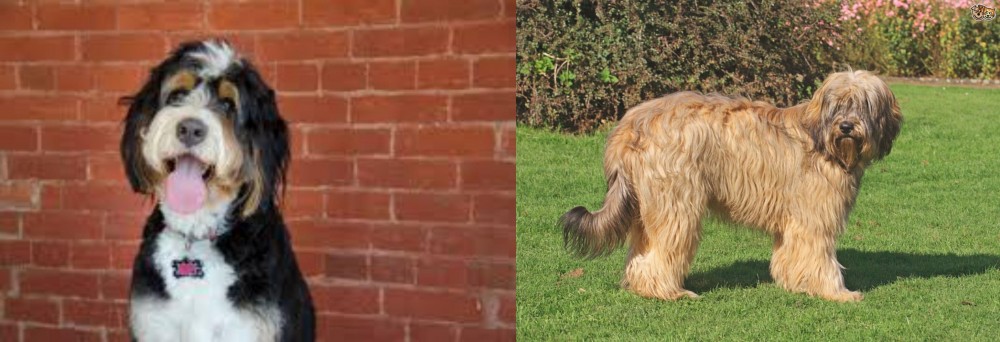 Bernedoodle is originated from Canada but Catalan Sheepdog is originated from Spain. Bernedoodle may grow 12 cm / 4 inches shorter than Catalan Sheepdog. Bernedoodle may weigh 16 kg / 36 pounds more than Catalan Sheepdog. Both Bernedoodle and Catalan Sheepdog has almost same life span. Bernedoodle may have more litter size than Catalan Sheepdog. Both Bernedoodle and Catalan Sheepdog requires Moderate Maintenance.
Bernedoodle is originated from Canada but Catalan Sheepdog is originated from Spain. Bernedoodle may grow 12 cm / 4 inches shorter than Catalan Sheepdog. Bernedoodle may weigh 16 kg / 36 pounds more than Catalan Sheepdog. Both Bernedoodle and Catalan Sheepdog has almost same life span. Bernedoodle may have more litter size than Catalan Sheepdog. Both Bernedoodle and Catalan Sheepdog requires Moderate Maintenance.
 The Bernedoodle is a hybrid cross between the Bernese Mountain Dog and the Standard Poodle. They have been around for many, many years but the first official” cross between the two breeds came from Sherry Rupke out of SwissRidge Kennels. The first Bernedoodle were achieved in 2003. She now has an entire breeding program for this hybrid.
The Bernedoodle is a hybrid cross between the Bernese Mountain Dog and the Standard Poodle. They have been around for many, many years but the first official” cross between the two breeds came from Sherry Rupke out of SwissRidge Kennels. The first Bernedoodle were achieved in 2003. She now has an entire breeding program for this hybrid.
A bernedoodle or a first generation is a cross between a purebred a purebred Poodle and a purebred Bernese Mountain Dog. This is a 50/50 mix. This mix is a very low shedding dog and though no dog is hypoallergenic, the Bernedoodle is as close as it gets. If the cross is true between two purebred dogs, the new breed will have the calm, sweet demeanor of the Bernese Mountain Dog and the intelligent, goofy, playfulness of the Poodle. At the same time the Bernedoodle is a hybrid so there will not be two exactly alike.
With purebred dogs you get a lot of consistency from one dog to another. Not so with the Bernedoodle. Each one will be a little different. Sometimes a hybrid dog can be healthier than their parents. Other times there can be health issues with hybrid. It is all about the breeder and if they breed for the right health traits.
If the breeder is conscientious enough the pup will have the best characteristics of both original breeds. Therefore, the Bernedoodle is happy, smart, playful, friendly and social. Sometimes the breeding doesn’t go as planned and you can end up with a Bernedoodle with the stubbornness of the Bernese or the hyper activity of the poodle. As a new cross breed, the Bernedoodle is not recognized by the American Kennel Club because it is a hybrid. They are recognized by the International Designer Canine Registry, The American Canine Hybrid Club, The Designer Dogs Kennel Club.
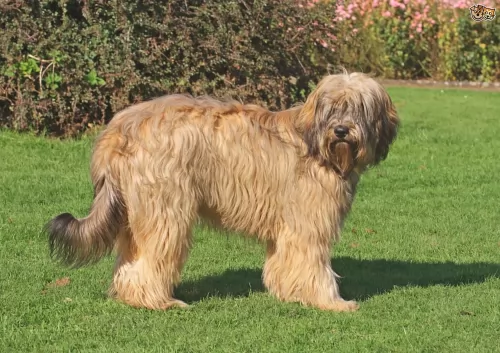 The Catalan Sheepdog, known also as the Gos d’Atura, hails from Catalonia, Spain. It is believed that the dog is related to the Portuguese- and Pyrenean Sheepdogs.
The Catalan Sheepdog, known also as the Gos d’Atura, hails from Catalonia, Spain. It is believed that the dog is related to the Portuguese- and Pyrenean Sheepdogs.
The standard for this breed was formulated in 1929. The sheepdog developed during Roman Empire times between 200 and 100 BC already, being used as livestock guard dogs. With the breed dwindling in the 1970s, Catalonian Sheepdog lovers started promoting it, but it remains a rare breed.
 Since the Bernedoodle is a hybrid and not an AKC recognized breed, there is no set-in stone breed standard. There are three sizes of Bernedoodles and at least three generations. All of these should be strong boned dogs with powerful and compact bodies. They have log ears, button eyes and a triangle shaped muzzle. The tail is long and bushy, and the coat is medium to long.
Since the Bernedoodle is a hybrid and not an AKC recognized breed, there is no set-in stone breed standard. There are three sizes of Bernedoodles and at least three generations. All of these should be strong boned dogs with powerful and compact bodies. They have log ears, button eyes and a triangle shaped muzzle. The tail is long and bushy, and the coat is medium to long.
There is no standard color, but the most common color is black and white or tri like the Bernese Mountain Dog. They can also be black and brown, sable or merle. The coat is wavy or curly like the poodle.
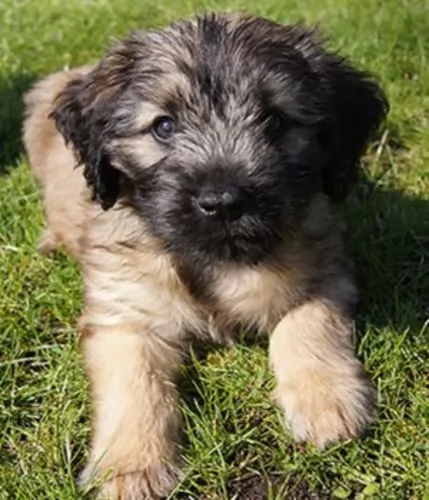 The Catalan is a medium sized dog but gives the impression of being bigger than he actually is. He stands from 45 – 55cm in height and weighs between 20 to 25kg.
The Catalan is a medium sized dog but gives the impression of being bigger than he actually is. He stands from 45 – 55cm in height and weighs between 20 to 25kg.
This breed also has double dew claws on the hind feet. He has a long coat which is slightly wavy and available in different shades such as fawn to brownish to dark grey to black. He has floppy, feathery ears and a fairly long, feathery tail. He has quite a bit of hair on he face too, so you’ll notice a beard, moustache as well as hair which covers the eyes somewhat.
Brave and courageous, the Catalan Sheepdog is also intelligent, active and hardy. He has a round face with a friendly, amicable expression. He is totally pleasant and sweet natured. However, in his role as guardian of sheep he took his role seriously, forming a strong relationship with both shepherd and sheep.
He is wary of strangers. Early socialization and training is always important, and while he makes a wonderful family pet, this training and socialization makes him more relaxed and obedient and he gets on well with children in the home as well as with other pets. While he is a placid, docile and gentle pet, he is also looked upon as a protector, and will defend his family.
 This is a very social dog that needs to be with people. If you don’t have a lot of time for a dog, then this is not the one for you. He is gentle, calm and affectionate. He is intelligent and sometimes stubborn. They need to be socialized early in life and they will be great with kids and other small animals. They tend to be very playful. Toys and minis have more energy, more stubbornness and more of the poodle divaness.
This is a very social dog that needs to be with people. If you don’t have a lot of time for a dog, then this is not the one for you. He is gentle, calm and affectionate. He is intelligent and sometimes stubborn. They need to be socialized early in life and they will be great with kids and other small animals. They tend to be very playful. Toys and minis have more energy, more stubbornness and more of the poodle divaness.
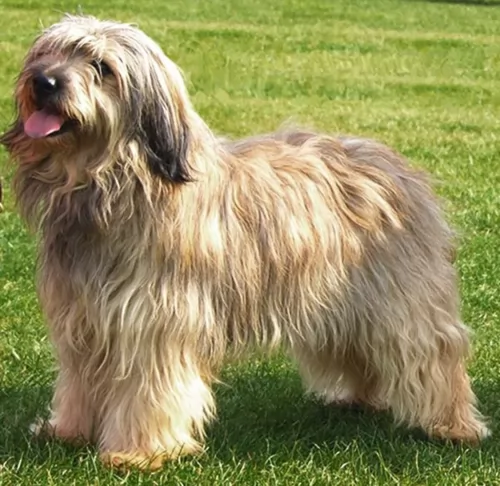 The Catalan Sheepdog is such an amicable character – he is going to make an awesome pet. He is an intelligent and obedient dog and is easily trained.
The Catalan Sheepdog is such an amicable character – he is going to make an awesome pet. He is an intelligent and obedient dog and is easily trained.
He has been used for guarding- and herding work and as a family pet makes a excellent guard dog as well. Capable of being gentle too, he is everything his human family wants him to be and just becomes a regular member of the family.
 Because the breed is so new and bred pure so far, there is not a lot of information about their health or their life span. Even as they seem to have less issues than their parents – the Bernese cancer issue for example does not seem to plague the Bernedoodle. However, that does not mean they don’t have issues. They are still prone to some serious issues.
Because the breed is so new and bred pure so far, there is not a lot of information about their health or their life span. Even as they seem to have less issues than their parents – the Bernese cancer issue for example does not seem to plague the Bernedoodle. However, that does not mean they don’t have issues. They are still prone to some serious issues.
Skin issues, hip and elbow dysplasia, and eye issues are prevalent in this new breed. They have a tendency toward hot spots and sometimes allergies. Asks a reputable breeder if they have tested the parents and the puppies for dysplasia and eye issues.
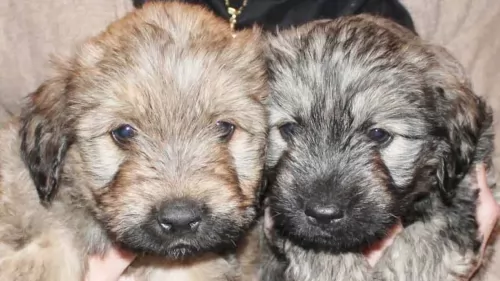 The Catalan Sheepdog is a fairly healthy breed and has a life expectancy of 12, 13 or 14 years. Nonetheless you will still need to watch out with common dog ailments with him, particularly hip dysplasia.
The Catalan Sheepdog is a fairly healthy breed and has a life expectancy of 12, 13 or 14 years. Nonetheless you will still need to watch out with common dog ailments with him, particularly hip dysplasia.
This is a joint and hip disease which can start with symptoms from 6 months of age already. Your dog will be hesitant to play and jump, doesn’t like to go upstairs, tires easily during a walk and develops a hop-like way to walk. You’ll notice that when he lies down, he battles to- or is reluctant to get up again.
X-rays may be required to confirm the diagnosis of hip dysplasia. There are different treatment options, all with the wellbeing of your pet in mind. You don’t want him to have a life of pain and lameness.
 Since the Bernedoodle comes in three different sizes, there will be three different feeding regimens. No matter the size of your dog, feed them quality food twice a day. The standard is a big dog and should be fed as such but the toy and mini will eat a lot less. You can pretty much feed a standard Bernedoodle the same thing you feed a Bernese Mountain Dog. The Bernedoodle is a picky eater and you may have to change up their food at times to keep them interested.
Since the Bernedoodle comes in three different sizes, there will be three different feeding regimens. No matter the size of your dog, feed them quality food twice a day. The standard is a big dog and should be fed as such but the toy and mini will eat a lot less. You can pretty much feed a standard Bernedoodle the same thing you feed a Bernese Mountain Dog. The Bernedoodle is a picky eater and you may have to change up their food at times to keep them interested.
Again, these are healthy dogs because the cross breed is so young. There are not a lot of genetic issues. As mentioned previously hip dysplasia, eye issues, elbow dysplasia and skin issues are possible.
This is a calm, not over active dog. They do not share the high energy level of the poodle but rather carry the calm, gentle energy of the Bernese. The toy and mini varieties tend to have a faster motor than the standard. They need daily walks no matter what their size is. They will need your attention regularly.
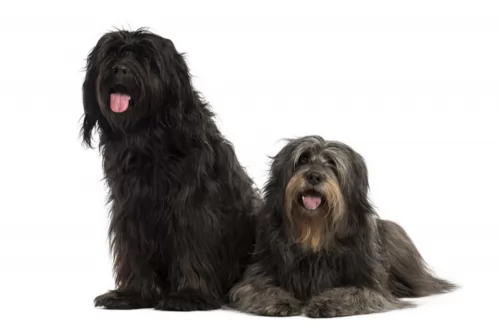 The Catalan Sheepdog is a working breed, so he is going to need plenty of exercise. While he adapts easily to city- or country life, it will be to his benefit to have a garden to romp in. You will still need to take him for walks and play ball- and rope games with him. This will prevent boredom and destructive behavior from him.
The Catalan Sheepdog is a working breed, so he is going to need plenty of exercise. While he adapts easily to city- or country life, it will be to his benefit to have a garden to romp in. You will still need to take him for walks and play ball- and rope games with him. This will prevent boredom and destructive behavior from him.
The Catalan Sheepdog has long hair so he will need to be brushed twice a week to avoid matting. This will help to remove loose hair too, but also distribute natural oils through his coat, keeping his hair and skin healthy and free from skin rashes and itchiness.
This brushing ensures other benefits as you can simultaneously check him for parasites such as fleas and ticks.
If you feed him commercial dog food, make sure its a high quality one. He is an active breed so will require high protein. Give him some homemade rice, vegetables and meat, and include raw meat in his food from time to time too. Always ensure that there is fresh, cool water constantly within reach.